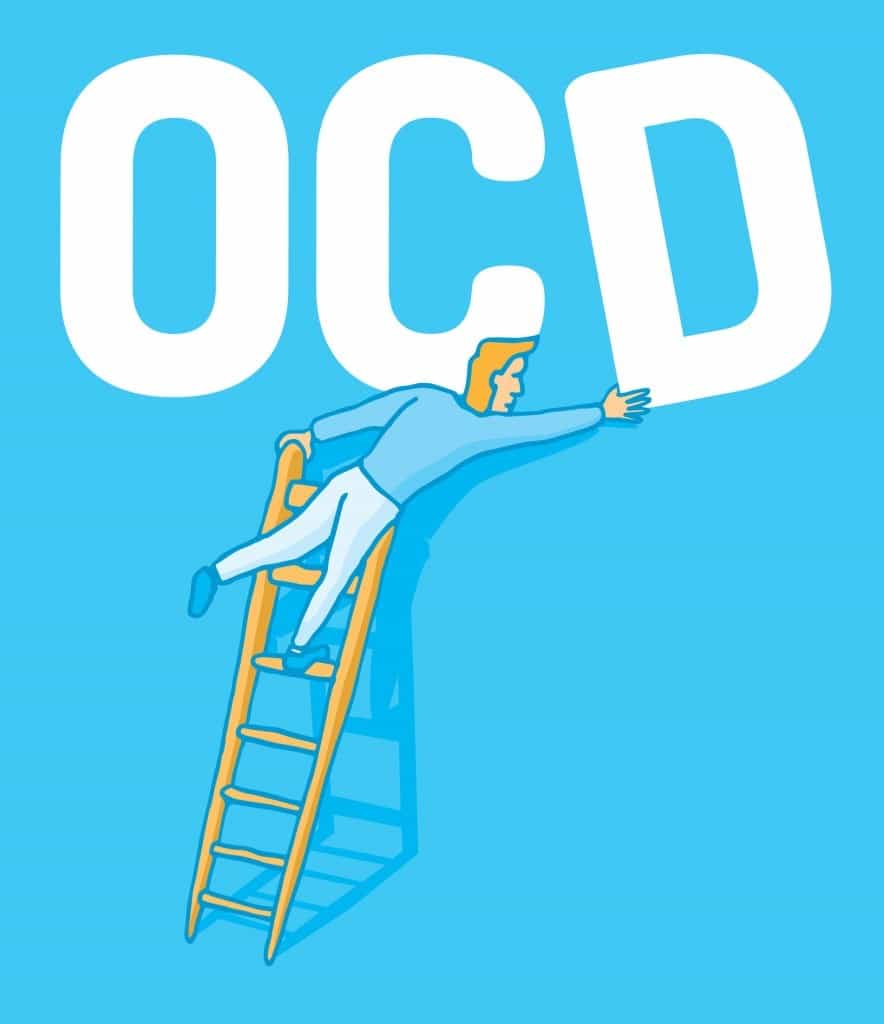
OCD is like an anxiety alarm in the brain. It's when someone gets thoughts, pictures, or strong urges that make them anxious. To feel better, they end up doing certain things over and over. It's like trying to turn off the alarm.
Imagine a cartoon where a person with OCD is on a ladder, fixing the words OCD to make them straight. That's what it's like – trying to fix things in their mind.
OCD tricks the brain into thinking too much about one thing. Even if they know it doesn't make sense, they can't stop it. It's like a strong feeling they can't control.
What are the Symptoms?
Some people might notice a bit of these feelings or behaviors, but in OCD, they become super strong. They mess up regular life – like hanging out, attending school, or being with family. It's like having an annoying guest all the time. People with OCD do things over and over, even though they know it's a problem. These actions can really get in the way of normal life. Those repeating thoughts don't quit, making it hard to focus on everyday stuff. These signs show up for more than an hour each day and can change over time.
Obsessions:
- Losing Control: Worried they'll do something harmful to themselves or others.
- Unwanted Thoughts: Bad sexual thoughts that they don't like.
- Religious Worries: Thoughts that go against their beliefs.
- Fear of being dirty or sick: Scared of germs, dirt, disease, chemicals, etc.
- Fear of Harm: Anxious about hurting others accidentally.
- Perfectionism: Wanting things perfect, evenness, not forgetting stuff, not losing things, or being unsure if they should throw stuff away.
- Superstitions: Thinking some numbers or colors are good or safe, while others are bad or unlucky.
Compulsions (rituals):
- Checking: Always looking to see if the door's locked or the oven's off.
- Cleaning: Washing, showering, and cleaning too much.
- Mind Games: Doing things in their head to feel safe, like praying, counting, or reviewing.
- Repeating: Doing stuff over and over, like reading or moving around.
- Arranging: Making everything just right and in order.
- Hoarding: Keeping things they don't need and not throwing them out.
What Makes OCD Happen?
OCD can come from your family – it runs in families. Genes are a part of it, but not the full story. Scientists found that the brain's front part and a deeper part don't talk well in people with OCD. A chemical called serotonin has something to do with it.
If you, a parent, or a sibling have OCD, there's about a 25% chance someone else in the family could get it too. Most times, people find out they have OCD by age 19. In the U.S. About 2.2 million adults have it.
How to Treat OCD?:
OCD may not have a cure, but effective treatments exist. Cognitive Behavioral Therapy (CBT) is a powerful approach that helps change the way you think, behave, and react to situations, reducing anxiety and fear. Sometimes, doctors combine therapy with antidepressants (SSRIs) to enhance results. In certain cases, serotonin-based medications or cognitive behavioral therapy can help normalize brain circuits linked to OCD.
Expert Consensus: 13-20 weekly sessions are the standard treatment duration.
- Exposure and Response Prevention: This method involves facing your obsessions while avoiding typical compulsive behaviors. By doing so, you build self-control, allowing your mind and body to discover alternative ways to cope with anxiety. This technique boasts the strongest evidence in its favor.
- Cognitive Therapy: Focusing on your exaggerated and negative thoughts, this approach teaches healthy ways to manage and respond to obsessive thoughts.
- Family Therapy: OCD can strain family life, but family therapy fosters understanding and empowers family members to support their loved ones with OCD. It can ease tensions that worsen symptoms and discourage family members from enabling or participating in compulsive behaviors.
These methods offer a comprehensive approach to treating OCD, helping individuals regain control over their lives.
Frequently Asked Questions (FAQs)
What is OCD, and how can it be described?
OCD is like an anxiety alarm in the brain. It occurs when individuals have thoughts, images, or strong urges that make them anxious. To ease their anxiety, they engage in repetitive behaviors, much like trying to turn off the alarm.
How does OCD affect the brain?
OCD tricks the brain into excessive focus on one thing, even when individuals know it doesn’t make sense. It's like a strong, uncontrollable feeling that they can’t ignore.
What are the typical symptoms of OCD, and how do they impact daily life?
OCD symptoms can be intense, disrupting regular life activities such as socializing, attending school, or spending time with family. It's like having an unwelcome guest constantly around. People with OCD engage in repetitive behaviors, even though they recognize it’s a problem. These actions significantly interfere with daily life and can make it hard to concentrate.
Is there a cure for OCD, and what are the treatment options?
While OCD may not have a cure, effective treatments are available. Cognitive Behavioral Therapy(CBT) is a powerful approach that changes thought patterns and behaviors, reducing anxiety and fear. Sometimes, doctors combine therapy with antidepressants (SSRIs) to enhance results. In certain cases, serotonin-based medications or cognitive behavioral therapy can help normalize brain circuits linked to OCD. The standard treatment duration is usually 13-20 weekly sessions.




